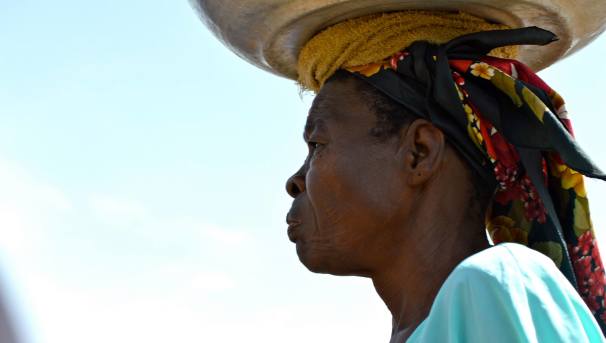Visualize
This project has ended, but you can still support amazing Berkeley initiatives by visiting give.berkeley.edu. Your continued support of our students, faculty and staff will ensure that Berkeley remains the #1 public university. Go Bears!
Visualize is an organization dedicated to empowering and supporting midwives to screen for cervical cancer through thoughtful educational techniques. We have developed a low-fidelity cervical cancer screening training model that aids midwifes or other healthcare providers as they learn how to screen for cervical cancer using visual inspection of the cervix with acetic acid (VIA). VIA is a low-cost and effective cervical cancer screening method. The training model itself consists of a simulated vaginal cavity that uses an Arduino microcontroller and an LCD screen to provide modular electronic feedback that guides the user through the VIA procedure.

Every year, 275,000 women die from cervical cancer. Eighty percent of these cases occur in low and lower-middle income countries (LMICs). Screening for cervical cancer significantly reduces this mortality rate, given that most cervical cancer and pre-cancer cases caught early are treatable. In Ghana, where our project is based, cervical cancer is the number one cause of cancer-related death for women and less than 5% of women have ever been screened. The commonly used Western screening method of the Pap smear is expensive and inappropriate for use in LMICs. Many LMICs lack the proper infrastructure for the Pap smear, and it is therefore not widely used. VIA is a low-cost and effective method to screen for cervical cancer but is not currently widely used, due to a lack of training and awareness of the method.
VIA is performed by:
- a midwife performs a pelvic examination and inserts a speculum into the patient’s vaginal cavity,
- the midwife visualizes the patient’s cervix for any existing abnormalities,
- the midwife applies acetic acid (table vinegar) to the cervix,
- the midwife observes the cervix one minute after application of acetic acid for any acetowhite lesions that may appear, signifying pre-cancerous cells, and
- upon visualization of lesions, the midwife either refers the patient to specialized medical care or uses cryotherapy to remove these cells.

The aim of our project is to design and implement training for VIA cervical cancer screening in Ghana. During a previous immersive experience run through the University of Michigan, members of our design team spent eight weeks observing Ob/Gyn departments and family planning clinics across Ghana. Working through an established connection with two major teaching hospitals in Ghana, we identified the need to train midwives to screen for cervical cancer with VIA. We then spent several months developing many prototypes for a physical training model to support VIA education.

This is a novel approach to addressing cervical cancer mortality. A number of people and organizations have attempted to address the issue of cervical cancer detection and early treatment before using VIA and their results have been very positive. However, none of these programs have focused specifically on developing and distributing an effective training method. This is the gap we are working to fill. Our training module aims to empower midwives to perform and teach others to perform VIA, a proven screening method that is affordable and accessible for women. By detecting pre-cancerous cells early, these women can get the treatment they need in time to save their lives.

Our immediate next steps include prototype refinement, collaborator engagement, and implementation plan finalization. In particular, we are exploring how the training model can be integrated into nursing and midwifery curriculum in Ghana. After distributing the training across Ghana, we can evaluate whether more midwives perform VIA correctly and effectively. This will lead to further refinements in the program design.

We’re using this crowdfunding campaign to reach out and ask for your support as we continue moving forward toward implementation. With your support, we have three aims:
- Support a team of two Ghanaian engineers to work with us to redesign the training model
- Purchase enough supplies for our prototyping efforts
- Travel back to Ghana for a pilot test of the training model
The local engineers we plan to work with will be able to provide their technical expertise along with their knowledge of local capabilities. This will help us ensure that the program may be successfully rolled out and taken up. We can then gain further feedback on training model and training program during a pilot test.

This work is a collaboration with many stakeholders and supporters in Ghana and in the U.S. As we continue to work on refining the training model, we are grateful to draw upon the support of these entities.


For more information on our work, check out:
http://insitu.engin.umich.edu/project/visualize-a-cervical-cancer-screening-trainer/
http://www.appropedia.org/Visualize
http://news.rice.edu/2014/03/31/wright-state-team-wins-global-health-design-competition-2/
We would love to hear from you! Please contact us if you have any questions or comments
Twitter - @VisualizeOrg
Julia Kramer - j.kramer@berkeley.edu
Maria Young - mariary@umich.edu
$25
Twitter Shoutout
We'll send you a shoutout on our Twitter page thanking you for your support
$50
Make A Statement
We'll invite you to make a statement on global health and/or design on our Twitter page (& enjoy all the above perks)
$150
Provide Prototyping Materials
$150 will provide enough funding to purchase prototyping supplies for continuous building and iterating (& enjoy all the above perks)
$500
Be an Impact Sponsor
$500 will provide enough funding to support one Ghanaian engineering intern for five months! Plus, we will give you recognition on all our future branded materials (website, blog, etc) as an Impact Sponsor (& enjoy all the above perks)
$1,100
Support One Intern
$1100 will provide enough funding to support one Ghanaian engineering intern for a year (& enjoy all the above perks)
$2,200
Support Two Interns
$2200 will provide enough funding to support two Ghanaian engineering interns for a year (& enjoy all the above perks)





